Joel was the one that tried to reel in timmy's dummy boxing aspects..ain't going to be no more of that lol..esp if teddy takes over his campI swear these wives as boxing managers hardly ever works out in the long run.
I can't remember if anything bad happened when the Pocket Rocket made that move, but he's prolly one of the exceptions.
Shane should of have been a lesson for everybody.
Bradley gonna learn.
You are using an out of date browser. It may not display this or other websites correctly.
You should upgrade or use an alternative browser.
You should upgrade or use an alternative browser.
Essential The Official Boxing Random Thoughts Thread...All boxing heads ENTER.
- Thread starter Jesus Is Lord
- Start date
More options
Who Replied?Cabo San Lucas breh. Humid as a mufukka though
I've only heard good things about that place...and you just added to it

Im gonna try and get there sometime in 2016 and check it out.
Enjoy yourself and watch out for the iguanas breh

mr heyzel
All Star

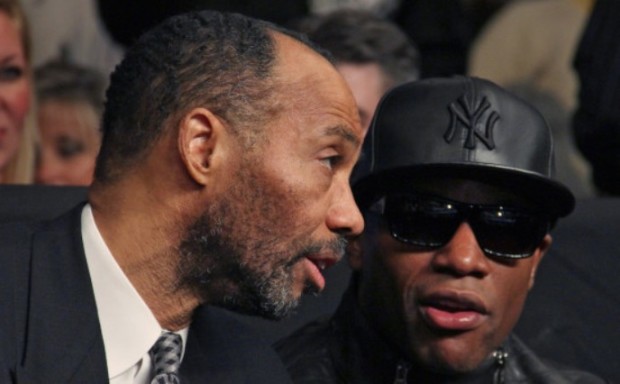
Columns 0
The Haymon Way
By Sean Crose · On September 2, 2015
It’s easy to despise Al Haymon, I suppose. The man comes across as rather disinterested in fans and shadowy in his dealings. But sometimes you have to step back and look at the big picture. I’m not saying Haymon isn’t doing harm to boxing. I’m just saying things have to be looked at objectively in order to arrive at such a conclusion fairly. Who knows? The guy may actually be doing some good.
First off, let’s take a look at the man himself. About four years ago, Greg Bishop of The New York Times did an impressive write-up on this most enigmatic of boxing’s players which was quite thorough, and it still makes for a fine source of reference.
Haymon is a product of Cleveland. He’s also a Harvard guy. That’s right, Al Haymon – like Bob Arum – has himself an Ivy League education. So much for boxing powerhouses being gangsters and dopes. Haymon first made his mark, however, in the field of concert and tour promotions. Eddie Murphy, MC Hammer, Whitney Houston: Haymon dealt with them all. In short, the guy wasn’t small time. Not by a long shot.
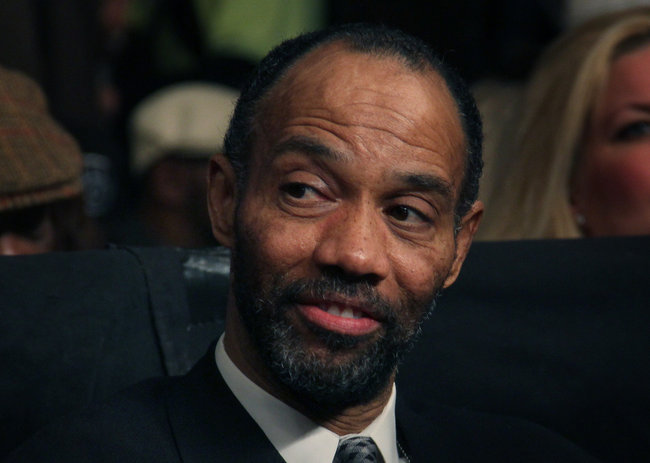
Haymon: in the shadows.
But Haymon was not a man content to put all of life’s eggs into one basket. He ended up being a television producer before finally working his way into boxing roughly 15 years ago. His first charge was welterweight champion Vernon Forrest.
“Starting with Forrest,” Bishop writes, “Haymon established his reputation as someone who maximized fighters’ incomes, often at the expense of promoters.” Sound familiar?
As Haymon’s power and stable grew, so did his reputation for being a mysterious, shadowy figure who may have acted as both a promoter as well as a manager, something clearly illegal in the U.S. thanks to the Muhammad Ali Reform Act. His also gained a reputation for giving highly paid fighters from his stable soft touches for lots of money.
Max Kellerman of HBO finally ended up voicing his frustrations with Haymon on the air, and needless to say, Haymon ended up going over to HBO’s main competitor, Showtime. Oh, and Haymon’s star client, one Floyd Mayweather Jr., made his way over to Showtime as well, for a humongous amount of money.
The Great Defection was such a massive move that it led to a huge Cold War between networks and promotional entities. And at first, it looked like the Haymon/Showtime camp was winning in a big way against HBO and rival entity Top Rank promotions. After all, Showtime had a massive and terrific year in 2013 with Mayweather vs Canelo and some great cable fights like Broner vs Maidana.
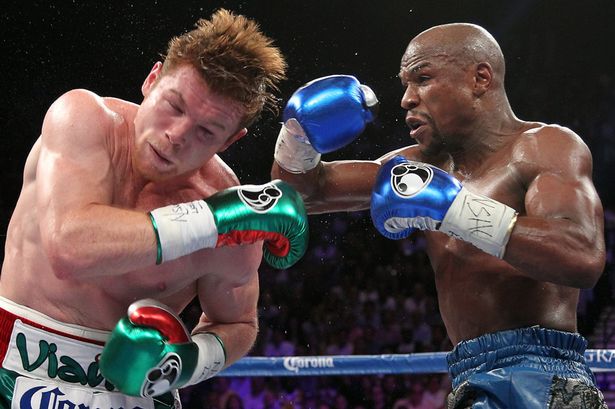
The Canelo vs Floyd snoozer was part of a huge year for Showtime.
Things began to change, however, in 2014, when Haymon’s big stars engaged in less-than-stellar fights on Showtime. Indeed, some of the matches, like the Garcia vs Salka mismatch, were downright offensive. HBO meanwhile, presented a stellar lineup, topped off by Sergey Kovalev’s brilliant battle against the legendary Bernard Hopkins.
Yet 2015 was to bring massive changes to the fight game. Massive changes indeed. First off, Haymon was able to make enough peace with Top Rank’s Arum to finally make the long dreamed of Mayweather vs Pacquiao bout a reality. What’s more, Haymon put major boxing cards back on network and cable television with his Premiere Boxing Champions series. Good or bad, it appears 2015 is a watershed year for boxing.
So, what to make of Haymon? Frankly, it’s difficult to see precisely where the man is coming from since he speaks to the press about as much as Thomas Pynchon. What’s more, his fighters are loyal to the man to a fault. You won’t find much badmouthing from Haymon’s stable, if there’s any badmouthing at all.
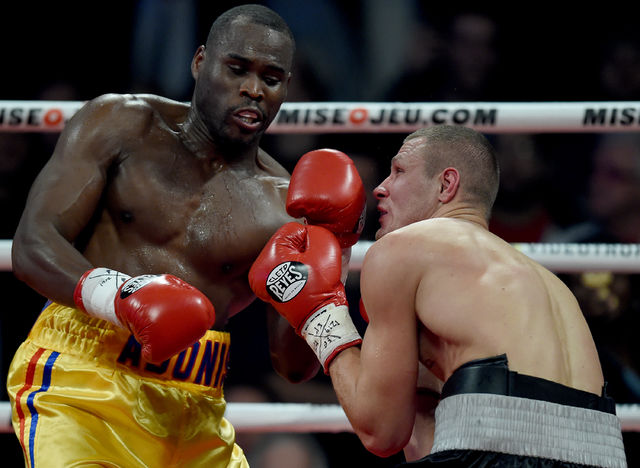
Adonis Stevenson: loyal to the Haymon Way.
Indeed, the loyalty Haymon inspires from his followers is – for lack of a better term –creepy. Is anyone worthy of the steady praise we hear these men sing about Haymon in bout after televised bout? Add this to the fact that some top Haymon fighters seem – on the surface at least – to shamelessly avoid serious competition, and there’s little wonder why Haymon is the subject of such suspicion and hostility.
Also worth noting is the fact that some wonder if Haymon’s Premier Boxing Champions series is merely a cash grab. The broadcasts are based on a time-buy, after all, which means networks had to be paid in order for the product to see air time. With few truly top level bouts coming out, some are wondering if the hedge fund which paid for the series made a serious mistake.
And while we’re at it, what’s the deal with Showtime? The network, which is attached to Haymon at the hip, isn’t showing much boxing these days, not much at all. Is Showtime even interested in fights after the major cash flow that came from the record haul from the #MayPac pay-per-view numbers?
Lastly, there’s the lawsuits. Yup, Golden Boy Promotions and Top Rank are both suing the Haymon Empire for doing just the sort of underhanded stuff it’s been accused of in the past. If Haymon ends up on the losing end of these battles, he may have to forfeit both a boatload of cash and a great deal of influence.
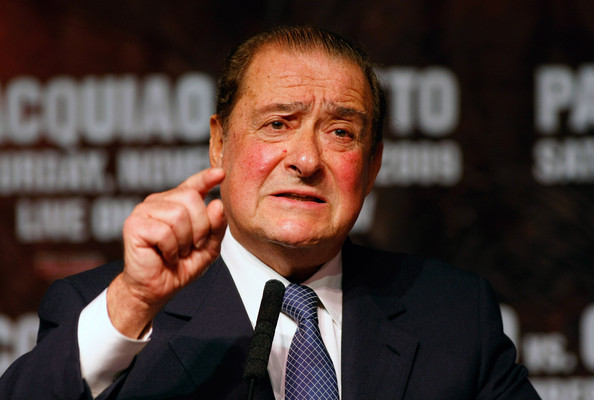
Bob Arum: once sued, now suing.
What’s all this mean for the fans, though? Nothing, for now. If Haymon loses in court, however…
As for the man’s influence on boxing, well, that’s tough to figure out. No one likes the fact that some Haymon fighters such as Garcia and Adonis Stevenson have gleefully taken on more cupcakes than a bakery, but everyone does like the fact that a good match like Thurman vs Guerrero or Santa Cruz vs Mares can now be seen without an added price tag to the monthly cable bill.
In the end, I suspect Haymon’s impact will be decided by the matches he allows to happen. The biggest draw of boxing, as I’ve stated before, is the question it asks of who is better than who. If fans pretty much know the answer already (ie., Mayweather vs Berto) then they’re going to watch UFC instead. But if Haymon decides to let the best fight the best with some regularity, then the man will become water to the bud which is current day boxing.
As always, time will tell the tale. — Sean Crose
Yea IDK what the breh was thinkingI swear these wives as boxing managers hardly ever works out in the long run.
I can't remember if anything bad happened when the Pocket Rocket made that move, but he's prolly one of the exceptions.
Shane should of have been a lesson for everybody.
Bradley gonna learn.
Can't understand why Bradley tryna play Joel like Nas did Jay
Dunno about all that Patrick. I've always like Joel, but that has not been the consensus around here. People were shytting on Joel left and right (especially when he was working with Cotto(n)), not too long ago. Moonwalkin on history again breh?Joel was the one that tried to reel in timmy's dummy boxing aspects..ain't going to be no more of that lol..esp if teddy takes over his camp
Can we get this fight made already
I wanna see em scrap now
Showtime could throw this on an undercard somewhere, or even PBC. Either way, this fight needs to happen. Maybe even on a Shane PPV

I wanna see em scrap now

Showtime could throw this on an undercard somewhere, or even PBC. Either way, this fight needs to happen. Maybe even on a Shane PPV

Last edited:
Man why are all these ninjas slandering haymon? Canelo/Floyd a snoozer, but Kovalev/BHop a brilliant battle? :jagsdahell:
 that
that
 that
thatDude tweeting like Mayorga now.
Kell es easy work. KO en uno.

Shane ended Mayorga's career and absorbed his soul like:

He has the spirit of Mayorgo within him now

ESPN podcast stated that Bradley reached out to Jerry Heller for advice.
#SOG_soldier
New York knicks and phoenix suns stan
Main reason I never stanned this nikka. He a lame :bhop12:Hes a simp beta, pretty sure 3 of those kids arent even his. And shes fat
krackdagawd
Inspire.
Timothy Bradley Jr., trainer Joel Diaz part ways after decade-plus together
3h - Boxing
- 364 Shares
- Comment

Timothy Bradley Jr. ended his working relationship with trainer Joel Diaz. Chris Farina/Top Rank
Boxers and trainers split up all the time. Many top fighters run through trainers at a dizzying pace. But welterweight titlist Timothy Bradley Jr. and trainer Joel Diaz were different. Through thick and thin they were like two peas in a pod.

Dan Rafael, ESPN Senior Writer
CloseFollow on Twitter
- 2013 BWAA Nat Fleischer Award winner for excellence in boxing journalism
- ESPN.com boxing writer since 2005
- Five years at USA Today
Diaz trained Bradley since his professional debut in 2004 and together they won five world titles in two weight classes -- one of them, of course, being the incredibly controversial split-decision welterweight title win against Manny Pacquiao in 2012.
Most recently, Bradley outpointed Jessie Vargas on June 27 to claim a vacant interim welterweight title. He was elevated to a full titleholder not long after the fight.
Despite the years or success, big fights and big money, Bradley told ESPN.com on Wednesday he felt it was time to move on. He fired Diaz a few days ago.
Diaz was disappointed. He blamed Monica Bradley, Timothy's wife and manager.
"After his last fight, I have not heard from Tim at all. He never answered my calls or anything," Diaz said. "Then last week, he came to the gym. He said he wanted to talk to me. I said, 'What's going on?' What he said was his manager had other plans and I am not part of those plans. He tried to make some excuses, like I was doing something wrong. I said, 'I've known you for a long time, you're like my brother, but right now it's out of your control. Your wife took over your career.'
"He said he would think about it. When they were negotiating the [Brandon] Rios fight, I was calling him to see what was going on. I had to go around him and call his father so his father can contact him because I don't even think he had a phone no more. I sensed something was going on. His wife got so involved. She didn't want me involved in the camp."
Diaz said during their meeting at the gym Bradley thanked him for everything he had done for him and voiced concerns about the way Diaz handled recent camps.
"He told me the last few fights things were not the same," Diaz said. "He was upset because I would leave camp for a day or two sometimes to be with my other fighters at fights. That is my job, but I always put Tim first. I said, 'Tim, that's not you talking. It's people in your ear who you live with. If we're going to work together let me know.' He said he would think about it, and two days later [on Sunday], he called and left a message and said he would move on and he would find another trainer.
"I couldn't even call him. I had to go through Monica. It became an issue of his manager taking over everything. She wanted to have control and power over everything. Look, Timothy is a great guy. He has a big heart, but he has people putting things in his head. I trained this kid his whole career. Monica was really cool at first, but the switch came when she became the manager. She'd come to the gym and try to control the training. I was feeling uncomfortable. It was weird. I never had a problem with Monica, never had an argument with her."
Diaz said he was not upset with Timothy Bradley and was not going say anything bad about him.
"I told him when he came to the gym [last week], 'The problem is not you. I know you from the heart. You are overpowered. You gave somebody too much authority of your life,'" Diaz said. "And I said, 'Good luck, champ.' Even if I'm not with him I will be at his next fight and I will root for him. I have no hard feelings, but I'm going to move on."
There are, of course, two sides to every story, and Bradley (32-1-1, 12 KOs) begs to differ with Diaz's version.
"It's my call. Ain't nobody make me do anything," Bradley said. "I did it because I felt it needed to be done. A real man wouldn't even blame a woman or my wife. My wife didn't speak to Joel. I spoke to Joel. I told him what was going on.
"At the end of the day, I don't trust him. What's the point of being with him if you don't trust him? If there's no trust, then there's no relationship."
Bradley said the breakup has been coming, but he said the final straw was the aftermath of the Vargas fight.
"Go back to the Jessie Vargas fight and go see if Joel Diaz is in the ring with me at the end of the fight," Bradley said. "He left. Right before they announced me as winner, he just left me. He didn't stick around for me. When we had the conversation, I asked him about it. 'Dude, you showed me you don't even care about me.' The answer was he was pissed off about something else somebody did on the team and decided to leave the ring.
"I was like, 'We've been together for like 10 years and you're going to just walk away? Stand by me, bro. If it's so easy for you to leave me like that, then it's easy to leave anytime.' I questioned if he cared for me."
Bradley said when he returned to the dressing room, Diaz was there with his family. He congratulated Bradley on the victory, "but it wasn't like it was before. It's not the same anymore. I felt like I needed a change. It's nothing bad about him. I'm just saying it like it is. I can't say anything bad about him.
"He blamed my wife, but I've been thinking about this since the fight. I'm a loyal guy, but I kept a lot of things in and I accepted a lot of things, but after so long being Mr. Nice Guy, I had to do this because some things were bothering me."
Bradley said although his wife has significant input into his career -- especially since taking over managing him after his contract with Cameron Dunkin ran out and he did not renew last year -- she does what he tells her to do in regard to his career.
"I give the OK on everything," Bradley said. "My wife is there to protect me, but it's my decision. I make the decisions because I have to live the decisions. I don't like that he blamed my wife."
As for who will assume training duties, Bradley said he has not hired anyone yet. However, he said he has talked to two prominent trainers, Teddy Atlas [also ESPN's ringside analyst] and Buddy McGirt. Bradley said he planned to meet with each soon to work for a couple of days with them to see if they mesh. He also might talk to others.
"I'm gonna talk to my wife and see when can we get them out to work with me," Bradley said of them coming to his hometown of Palm Springs, California. "I'll be fighting end of the year and I need to get someone in here."
Bradley has no opponent yet. The Rios talks fizzled, but he has a mandatory due against Sadam Ali, who could be his next foe. He said he is waiting to hear from promoter Top Rank, which is in talks with HBO, about the next fight.
But whomever he faces and whenever he gets into the ring, there will be a new trainer manning his corner.
"Good things come to an end. It's not a bad thing," Bradley said. "I'm looking for change. A lot of guys change trainers. It's nothing bad about Joel. Sometimes you just need a change. We won five world championships together. I would love to remain friends. Don't want to make this ugly. It's just business. I really like the guy a lot."
Timothy Bradley Jr., trainer Joel Diaz part ways after decade-plus together
@mr. smoke weed
Yeah, seems your boy turned the GPS off is about to just go down that Mosley route
"Sugar" Tim Bradley?
Countdown until divorce/she takes his belts

He wasn't the problem from what I can tell, Bradley not listening was.

Maybe shyt was different during camp I guess.


Columns 0
The Haymon Way
By Sean Crose · On September 2, 2015
It’s easy to despise Al Haymon, I suppose. The man comes across as rather disinterested in fans and shadowy in his dealings. But sometimes you have to step back and look at the big picture. I’m not saying Haymon isn’t doing harm to boxing. I’m just saying things have to be looked at objectively in order to arrive at such a conclusion fairly. Who knows? The guy may actually be doing some good.
First off, let’s take a look at the man himself. About four years ago, Greg Bishop of The New York Times did an impressive write-up on this most enigmatic of boxing’s players which was quite thorough, and it still makes for a fine source of reference.
Haymon is a product of Cleveland. He’s also a Harvard guy. That’s right, Al Haymon – like Bob Arum – has himself an Ivy League education. So much for boxing powerhouses being gangsters and dopes. Haymon first made his mark, however, in the field of concert and tour promotions. Eddie Murphy, MC Hammer, Whitney Houston: Haymon dealt with them all. In short, the guy wasn’t small time. Not by a long shot.

Haymon: in the shadows.
But Haymon was not a man content to put all of life’s eggs into one basket. He ended up being a television producer before finally working his way into boxing roughly 15 years ago. His first charge was welterweight champion Vernon Forrest.
“Starting with Forrest,” Bishop writes, “Haymon established his reputation as someone who maximized fighters’ incomes, often at the expense of promoters.” Sound familiar?
As Haymon’s power and stable grew, so did his reputation for being a mysterious, shadowy figure who may have acted as both a promoter as well as a manager, something clearly illegal in the U.S. thanks to the Muhammad Ali Reform Act. His also gained a reputation for giving highly paid fighters from his stable soft touches for lots of money.
Max Kellerman of HBO finally ended up voicing his frustrations with Haymon on the air, and needless to say, Haymon ended up going over to HBO’s main competitor, Showtime. Oh, and Haymon’s star client, one Floyd Mayweather Jr., made his way over to Showtime as well, for a humongous amount of money.
The Great Defection was such a massive move that it led to a huge Cold War between networks and promotional entities. And at first, it looked like the Haymon/Showtime camp was winning in a big way against HBO and rival entity Top Rank promotions. After all, Showtime had a massive and terrific year in 2013 with Mayweather vs Canelo and some great cable fights like Broner vs Maidana.

The Canelo vs Floyd snoozer was part of a huge year for Showtime.
Things began to change, however, in 2014, when Haymon’s big stars engaged in less-than-stellar fights on Showtime. Indeed, some of the matches, like the Garcia vs Salka mismatch, were downright offensive. HBO meanwhile, presented a stellar lineup, topped off by Sergey Kovalev’s brilliant battle against the legendary Bernard Hopkins.
Yet 2015 was to bring massive changes to the fight game. Massive changes indeed. First off, Haymon was able to make enough peace with Top Rank’s Arum to finally make the long dreamed of Mayweather vs Pacquiao bout a reality. What’s more, Haymon put major boxing cards back on network and cable television with his Premiere Boxing Champions series. Good or bad, it appears 2015 is a watershed year for boxing.
So, what to make of Haymon? Frankly, it’s difficult to see precisely where the man is coming from since he speaks to the press about as much as Thomas Pynchon. What’s more, his fighters are loyal to the man to a fault. You won’t find much badmouthing from Haymon’s stable, if there’s any badmouthing at all.

Adonis Stevenson: loyal to the Haymon Way.
Indeed, the loyalty Haymon inspires from his followers is – for lack of a better term –creepy. Is anyone worthy of the steady praise we hear these men sing about Haymon in bout after televised bout? Add this to the fact that some top Haymon fighters seem – on the surface at least – to shamelessly avoid serious competition, and there’s little wonder why Haymon is the subject of such suspicion and hostility.
Also worth noting is the fact that some wonder if Haymon’s Premier Boxing Champions series is merely a cash grab. The broadcasts are based on a time-buy, after all, which means networks had to be paid in order for the product to see air time. With few truly top level bouts coming out, some are wondering if the hedge fund which paid for the series made a serious mistake.
And while we’re at it, what’s the deal with Showtime? The network, which is attached to Haymon at the hip, isn’t showing much boxing these days, not much at all. Is Showtime even interested in fights after the major cash flow that came from the record haul from the #MayPac pay-per-view numbers?
Lastly, there’s the lawsuits. Yup, Golden Boy Promotions and Top Rank are both suing the Haymon Empire for doing just the sort of underhanded stuff it’s been accused of in the past. If Haymon ends up on the losing end of these battles, he may have to forfeit both a boatload of cash and a great deal of influence.

Bob Arum: once sued, now suing.
What’s all this mean for the fans, though? Nothing, for now. If Haymon loses in court, however…
As for the man’s influence on boxing, well, that’s tough to figure out. No one likes the fact that some Haymon fighters such as Garcia and Adonis Stevenson have gleefully taken on more cupcakes than a bakery, but everyone does like the fact that a good match like Thurman vs Guerrero or Santa Cruz vs Mares can now be seen without an added price tag to the monthly cable bill.
In the end, I suspect Haymon’s impact will be decided by the matches he allows to happen. The biggest draw of boxing, as I’ve stated before, is the question it asks of who is better than who. If fans pretty much know the answer already (ie., Mayweather vs Berto) then they’re going to watch UFC instead. But if Haymon decides to let the best fight the best with some regularity, then the man will become water to the bud which is current day boxing.
As always, time will tell the tale. — Sean Crose
is this guy serious? If I was signed to Haymon id be
 every day.
every day.is this guy serious? If I was signed to Haymon id beevery day.
Yep. Easier fights + more money?

That's a no-brainer

That's like if someone told you, "Hey, I'll pay you more money to work for me...AND the work is gonna be easier than what you're doing now. What do you say?
 "
"I dont understand why EVERY Boxer isnt working with Haymon

Countdown until divorce/she takes his belts
He wasn't the problem from what I can tell, Bradley not listening was.
Maybe shyt was different during camp I guess.
i felt the same way, timmy would be reckless in there and joel was telling him to stop and make the fight much easier with advice but he wouldnt listen.
i really hope his wife is not in his ear telling him "u really strong, u need to go out there and try to knock them out... joel is holding u back and making u into a boring fighter"



